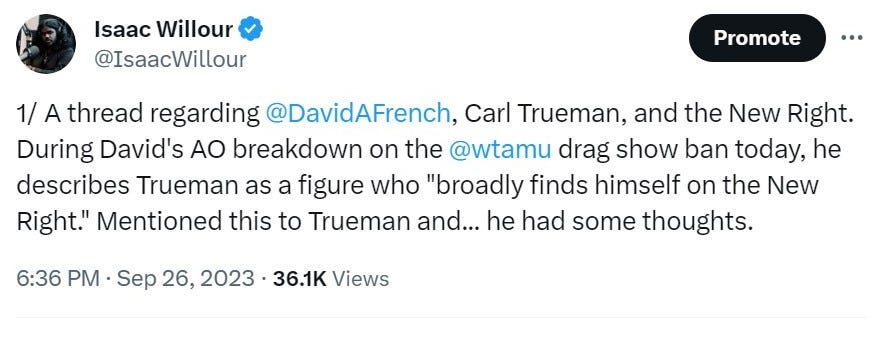The Other-ing of Carl Trueman
The church’s faithful shepherds have become pariahs in this strange new world.
Current debates over the New Right require more than a thorough understanding of our own side as a source for rebuttal—they require us to have a meaningful definition of who actually counts as ‘New Right.’ Casting too wide a net in this definition presents two major problems: an inability to distinguish between mainstream and extreme conservative philosophy, and further fracturing within the movement as legitimate conservative voices inevitably become targets of friendly (or not-so-friendly) fire.
David French’s recent treatment of Dr. Carl Trueman is a perfect example. Trueman, a pastor, intellectual historian, and author of The Rise and Triumph of the Modern Self: Cultural Amnesia, Expressive Individualism, and the Road to Sexual Revolution, became the latest target in New York Times columnist David French’s rhetorical polemics against the New Right. In a recent taping of The Dispatch’s Advisory Opinions podcast, French smeared Trueman as “broadly find[ing] himself on the New Right,” as well as “scorn[ing] people in the Christian conservative world who seek to protect the civil liberties of LGBT folks.”
French went on to provide a whopping list of zero examples of how Trueman is actually connected to the New Right in any meaningful way. “I'm very fascinated to find myself on the New Right, although I can't imagine they're too pleased about the company," mused Trueman in response, and he's not wrong—he's debated postliberal intelligentsia such as Patrick Deneen and publicly defended French against noted New Righter Sohrab Ahmari. The New Right can hardly be happy about the latest addition to their club, even were Trueman to be in ideological lockstep.
But the problem remains: he’s not. Carl Trueman is not now, and has never been part of the New Right. In a world nursing a seemingly perennial obsession with either twisting the past or idolizing the new, he's committed a far greater political sin—defending Christian orthodoxy in the face of a nakedly partisan age bookended by a blatant desire for state power on the far right and a truly pernicious capitulation to the reality-defying identity politics of the far left. Such is not an environment in which church or Gospel can long endure without faithful shepherds—shepherds who view their primary vocation as spiritual, not political, and as such do not fit into neat political categories.
Perhaps it should come as no surprise that such shepherds take flack from the political realm, and it certainly indicates no dereliction of duty. On the contrary, sadly, it means many, including some who claim the mantle of Christianity, have come to view advocating for both unapologetic truth and gentleness of spirit as somehow out of line with the task of the Christian in the modern age. Defending such orthodoxy is the dereliction of duty apparently, and the church’s faithful shepherds have themselves become the pariahs in this strange new world.
This post was published in edited form at Justin Stapley’s Freemen News-letter. Check it out here.
Read Trueman’s full response below:
Mr. French’s comments on me strike me as strange for a number of reasons.
First, the judge in question merely cited my work, without quoting me, as a source for a definition of expressive individualism and its significance for the modern social imaginary. The reference is to a descriptive, not prescriptive, section and, as far as I know, not controversial. It is simply representative of the state of the scholarship in the field. Such citations are also standard in such legal documents and carry no necessary ideological freight.
Second, this makes the comment about me not being an attorney very odd indeed. I am not being cited on a matter of law and so my legal qualifications, or lack thereof, are irrelevant.
Third, I do not scorn civil rights for LGBTQ people. Mr. French cites no evidence for this claim and I am hard-pressed to think of where he would go to do so. I am certainly concerned that the way civil rights have played out in our era of sexual and gender identity politics is both bad news for children and for religious freedom, but that is surely not the same as ‘scorning’ LGBTQ rights. In fact, while Mr. French remains a signatory to one of the most controversial documents produced by conservative Christians on the issue of homosexuality – the Nashville Statement – I myself declined to sign it because I considered it lacking in pastoral sensitivity. I thus find his characterization of me in this matter as being simply false, offensive and, given his own history with the Nashville Statement, quite bizarre.
Fourth, as to being part of the New Right (a rather American category to impose upon an immigrant), I am unsure how he defines that term and so it is hard to respond. I have always regarded myself as a political centrist. Centers shift, of course. Perhaps my book Republocrat is therefore now a ‘New Right’ manifesto? If so, its reputation today must be somewhat different to that when it was first published and garnered accusations that I was a socialist or worse.



